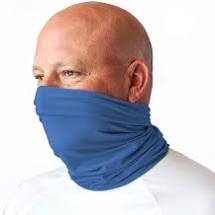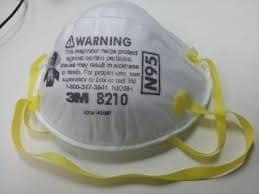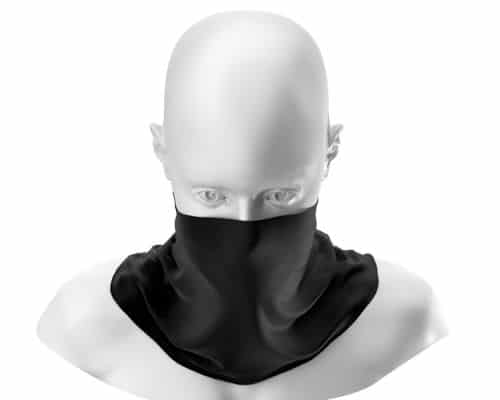These days, the message is everywhere…
Wear a face mask to protect yourself and others from the coronavirus.
But a new study shows that one of the most common types of masks may actually be worse than wearing no mask at all.[1]
Researchers at Duke University created a box-shaped device that could track the tiny respiratory particles that escape from people’s mouths when they speak.
They then had volunteers speak the same phrase into the box…first without a mask, and then while wearing one of 14 different types of face masks. They tested each mask 10 times.
The particles were videotaped as they passed through a sheet of light created by a laser.
Professor Warren S. Warren was one of the study’s authors. He said they were able to track “individual particles from frame to frame in the movie, to actually count the number of particles that got emitted.”[2]
In this way, they were able to tell which masks best limited the spread of respiratory particles that can spread the coronavirus.
An N95 mask was the most effective. It didn’t allow any droplets to pass through.
The least effective?
That was the neck gaiter. In fact, it was worse than no mask at all.
Professor Warren said neck gaiters are popular because they’re convenient to wear. “But the exact reason why they’re so convenient, which is that they don’t restrict air, is the reason why they’re not doing much of a job helping people.”
The study authors said that the porous gaiter fabric doesn’t just fail to block droplets. It breaks them up into smaller particles that float in the air longer. It makes droplets even more infectious than if a person wore no mask at all.
A neck gaiter (seen below) is a snug tube of cloth you wear around your neck. It can be pulled up over your face for sun or cold protection. Many people now use them as coronavirus face masks.

Dr. Morris Fischer was on the research team. He said the study shows “There are some masks that actually hurt rather than do good.”
Bandanas and knitted masks ranked almost as poorly as neck gaiters.
But other types of masks were found to be effective.
Professor Warren said: “There’s a lot of controversy and people say, ‘Well, masks don’t do anything.’ Well, the answer is some don’t, but most do.”
5 Effective Face Masks
The following face masks are all effective. The two most important factors to consider when deciding on a face mask are filtration and fit.
The higher the level of filtration, the more virus-carrying respiratory droplets the mask blocks. A snug fit keeps droplets from passing through the edges.[3]
- Cloth. On the upside, cloth masks are easy to get. You can purchase them online or from drugstores and department stores. And you can reuse them indefinitely. You should wash them after every use.

On the downside, their quality varies. The worst have filtration as low as 1%. The best can be as high as 79%. That’s better than surgical masks.
A cloth mask should have at least two layers of fabric—preferably tightly woven cotton, silk, linen, or polyester.
A study from Wake Forest Baptist Health Medical Center found that an effective cloth mask blocks out light when you hold it up to the sun. At the same time, it shouldn’t be so thick that you can’t breathe through it.
- Paper. A study published in the journal Environmental Science compared cloth to paper masks.

Microscopic examination showed paper masks had smaller holes that potentially block more respiratory droplets. And another study found paper was more effective at protecting against the flu. But paper masks are not reusable, and they can be hard to find.[4] [5]
- Surgical masks. These “accordion masks” have pleats that allow the wearer to expand them to the desired length. They usually cover more of your face than cloth masks.

And they have a metal band across the top that allows you to mold the mask to the contours of your nose and face.
On the downside, they aren’t made for repeated use. And they tend to be loose on the sides.
- Homemade masks. These work well as long as they are constructed correctly. Experts recommend using tightly woven cotton fabric.

If you make your own mask, it’s a good idea to insert a filter in the fabric. The CDC recommends coffee filters.
The CDC’s step-by-step guide to mask construction is here.
- N95 respirators. As the study above showed, these are the most effective face masks. At 95% they have the best filtration level, and they fit snugly. But they can only be used once, are uncomfortable, and can be difficult to breathe through.[6]

Cross these off your list. N95 masks are needed by health care professionals and are in short supply.
There’s no doubt that face masks are a valuable tool in lowering your COVID risk. Make sure to weigh your options and choose one that works for you.
Editor’s Note: Discover the single best supplement for stronger immunity… The fruit extract that helps 93% of people with respiratory viruses get better in just two days… The germ hotspot that most of us forget to sanitize. Find all this and more in Independent Healing’s Coronavirus Pandemic Guide. Go HERE.
Related Articles
No, Mask Wearing Is Not Just to Protect Others
Coronavirus: The Heart Effects Are Scary
CBD May Help Lungs Resist COVID Destruction, Study Finds
[1]https://advances.sciencemag.org/content/early/2020/08/07/sciadv.abd3083
[2]https://www.washingtonpost.com/lifestyle/wellness/mask-test-duke-covid/2020/08/10/4f2bb888-db18-11ea-b205-ff838e15a9a6_story.html
[3]https://www.headcovers.com/blog/surgical-masks-the-best-types-of-face-masks-for-virus-protection
[4]https://peerj.com/articles/7142
[5]https://www.ncbi.nlm.nih.gov/pmc/articles/PMC4420971
[6]https://www.nytimes.com/2020/06/01/health/masks-surgical-N95-coronavirus.html

